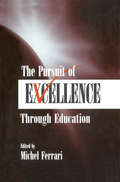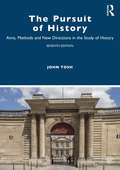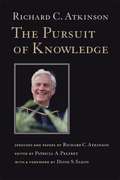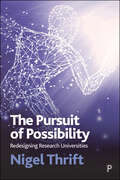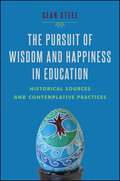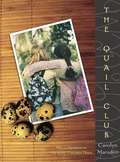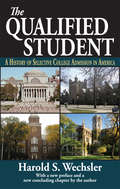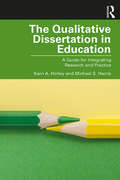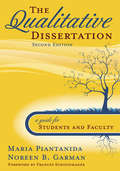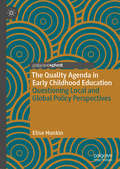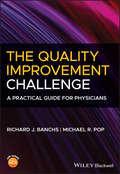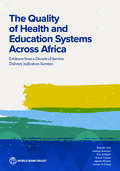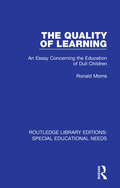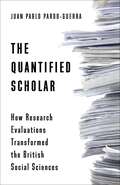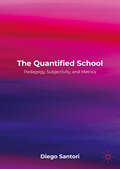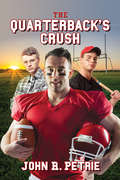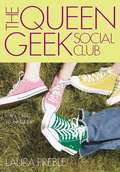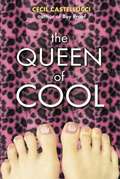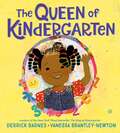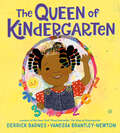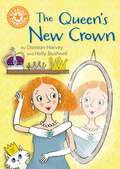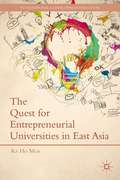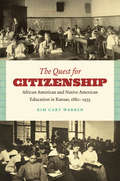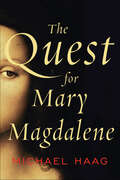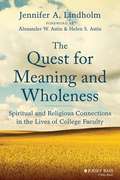- Table View
- List View
The Pursuit of Excellence Through Education (Educational Psychology Series)
by Michel FerrariAlthough specific definitions may change over time, few goals are considered more important to education than the pursuit of academic excellence. There are many different viewpoints on this issue today among educational psychologists and other social scientists. One particularly glaring fault line in the debate divides those who emphasize developing individual learning and those who focus on promoting cultural and institutional reform. These two perspectives are rarely addressed in a single volume. In this book, well-known theorists and researchers present a range of perspectives on how to promote excellence in education. This allows those who stress transformation of educational practice and those who emphasize individual abilities to speak to each, and invites readers to jointly consider the arguments for both positions, or for some synthesis of the two. The point is to consider how these two divergent viewpoints can be reconciled, or simply coordinated, in an effort to benefit both students and society at large. The main thesis is that excellence can be fostered without sacrificing equity, both of which are fundamental tenets of a democratic education. The issues addressed in this book have implications and relevance for school reform efforts and across the fields of educational psychology, curriculum and instruction, philosophy of education, and educational leadership. The volume provides a unique source for students and teachers in various disciplines who want to gain a broader and more integrated view of the nature and development of excellence through education.
The Pursuit of History: Aims, Methods and New Directions in the Study of History
by John ToshThis classic introduction to the study of history invites the reader to stand back and consider some of its most fundamental questions – what is the point of studying history? How do we know about the past? Does an objective historical truth exist and can we ever access it? In answering these central questions, John Tosh argues that, despite the impression of fragmentation created by Postmodernism in recent years, history is a coherent discipline which still bears the imprint of its nineteenth-century origins. Consistently clear-sighted, he provides a lively and compelling guide to a complex and sometimes controversial subject, while making his readers vividly aware of just how far our historical knowledge is conditioned by the character of the sources and the methods of the historians who work on them. History does not stand still, and this updated seventh edition deals with complex and wide-ranging material in a clear and accessible way that is up-to-date with current historiographical trends. A fuller treatment is given to the importance of digitization both in the section on source criticism and in relation to public history, reflecting its growing importance within historical study. Both the text and references have been expanded to include a fuller range of both American and global scholarship, and the book concludes with a forthright reminder that historical perspective illuminates major problems in the present. Lucid and engaging, this edition retains the user-friendly features that make it a favourite with both students and lecturers, including marginal glosses, illustrations and suggestions for further reading. Along with its companion website, this is an essential guide to the theory and practice of history.
The Pursuit of Knowledge: Speeches and Papers of Richard C. Atkinson
by Patricia Pelfrey Richard C. AtkinsonThis selection of the speeches and papers of Richard C. Atkinson reveals that President Atkinson's administration was marked by innovative approaches that deliberately shaped UC's role in a changing California. These writings tell the story of the national controversy over the SAT and Atkinson's successful challenge to the dominance of the 75-year-old college entrance examination.
The Pursuit of Possibility: Redesigning Research Universities
by Nigel ThriftAre British research universities losing their way or are they finding a new way? Nigel Thrift, a well-known academic and a former Vice-Chancellor, explores recent changes in the British research university that threaten to erode the quality of these higher education institutions. He considers what a research university has now become by examining the quandaries that have arisen from a succession of misplaced strategies and false expectations. Challenging both higher education policy and leadership, he argues that the focus on student number growth and a series of research policy missteps has upset research universities’ priorities just at a point in the history of planetary breakdown when their research is most needed.
The Pursuit of Wisdom and Happiness in Education: Historical Sources and Contemplative Practices
by Sean SteelModern scholarship has struggled to come to terms with the meaning of wisdom and its significance in the field of education. This book examines the importance of pursuing wisdom in schools by turning to ancient and medieval sources for clarification concerning the nature of wisdom. Sean Steel argues that our current emphasis on the development of rigorous critical-analytic thinking skills, on assessment, and on accountability in education has negatively impacted the ability of schools to foster an environment in which both students and teachers might pursue wisdom. Although in recent times efforts have been made to incorporate the pursuit of wisdom into schools through Philosophy for Children (P4C) and contemplative education programming, such initiatives have missed their mark. Steel therefore recommends not more accountability in education for the purpose of ensuring global competitiveness, but rather the institutional promotion of periods of leisure or schole in the school day.Drawing upon his own experiences as a teacher who has tried to encourage students to search for wisdom, the author discusses some of the challenges and pitfalls of wisdom seeking. He also offers examples of various wisdom-seeking activities that might bear fruit in the classroom.
The Quail Club
by Carolyn MarsdenLike "The Gold-Threaded Dress", Carolyn Marsden's acclaimed first novel, this sensitive and finely crafted sequel explores what it takes to be a true friend, and still be true to yourself. Oy lives in America now, but she loves to go to the back room of Pak's auto shop on Saturdays to learn traditional Thai dances. She loves it almost as much as being a member of the "Quail Club" -- five friends who gather after school to hatch and care for baby quail. When the teacher announces a talent show, Oy knows how proud her family and Pak would be to see her step onstage in her beautiful gold-threaded dress from Thailand. But bossy Liliandra vows to kick her out of the Quail Club if she won't team up for a very different kind of dance. Someone will be disappointed. But who?
The Qualified Student: A History of Selective College Admission in America
by Harold S. WechslerIn The Qualified Student Harold S. Wechsler focuses on methods of student selection used by institutions of higher education in the United States. More specifically, he discusses the way that college and university reformers employed those methods to introduce higher education into a broader cross-section of America, by extending access to an increased number of students from nontraditional backgrounds. Implicit in much of this book is an underlying social and ethical question: How legitimate was and is higher education's regulation of social mobility? Public concern over colleges' and universities' practices became inevitable once they became regulators between social classes. The challenging of colleges' admissions policies in the courts augments similar concerns that have been present in legislatures for decades. The volume is divided into three main sections: Prerequisites, Columbia and the Selective Function, and Implications. It focuses mainly on four universities, The University of Michigan, Columbia University, the University of Chicago, and the City University of New York. Wechsler maintains that unlike other universities, these institutions were pacesetters; they did not adopt a new policy simply because some other college had already adopted it. A new introduction brings the book, originally published in 1977, up to date and demonstrates its continuing importance in today's academic world of selective admissions.
The Qualitative Dissertation in Education: A Guide for Integrating Research and Practice
by Karri A. Holley Michael S. HarrisThe Qualitative Dissertation in Education focuses on the experiences of students pursuing a doctorate in education and writing a qualitative dissertation. The literature on qualitative research has grown substantially over the past 25 years, but methods books often fail to consider the unique situations and resources available to students pursuing a professional doctorate. This book examines the entirety of the dissertation experience, walking readers through the process with examples and guidelines. The structure of the book outlines each chapter of the dissertation as well as the necessary steps to start and complete the dissertation, such as working with a faculty chair and committee, developing a peer support group, and organizing literature. Not only does the book cover each stage of the dissertation process, it also provides practical guidance on topics such as productivity, with exercises and resources to help students overcome obstacles and make progress in their writing. The Qualitative Dissertation in Education provides a foundation to understand both the basics of qualitative research and the expectations of the EdD dissertation.
The Qualitative Dissertation: A Guide for Students and Faculty (2nd Edition)
by Maria Piantanida Dr Noreen B. GarmanFocused on making reflection an integral part of the journey, this updated resource guides readers through the process of researching, writing, and defending a qualitative dissertation.
The Quality Agenda in Early Childhood Education: Questioning Local and Global Policy Perspectives
by Elise HunkinThis book investigates notions of ‘quality’ in early childhood settings both in Australia and globally. After experiencing quality reform as an educator, the author turned to research as a means by which to better understand early childhood quality reform and agenda over time. This book questions how early childhood reform policy and agenda have constructed quality - what it is presumed to be and do - over time and the implications of these 'truths'. Taking a Foucauldian governmentality view of the history of Australian early childhood services, the impetus for the quality reform era, the quality reform policy assemblages and the contemporary post-reform era, this book rigorously examines prevailing policy assumptions, ambitions and deployments of quality, and warns of an emerging ambition for ‘only quality’ settings in early childhood. This book will appeal to early childhood students and educators, education policy sociologists and all who are interested in reclaiming early childhood education and care.
The Quality Improvement Challenge: A Practical Guide for Physicians
by Richard J. Banchs Michael R. PopEfforts to improve the quality of healthcare have failed to achieve a meaningful and sustainable improvement. Patients continue to experience fragmented, inconvenient, and unsafe care while providers are increasingly becoming overburdened with administrative tasks. The need for change is clear. Healthcare professionals need to take on new leadership roles in quality improvement (QI) projects to effect real change. The Quality Improvement Challenge in Healthcare equips readers with the skills and knowledge required to develop and implement successful operational improvement initiatives. Designed for healthcare providers seeking to apply QI in practice, this valuable resource delivers step-by-step guidance on improvement methodology, team dynamics, and organizational change management in the context of real-world healthcare environments. The text integrates the principles and practices of Lean Six Sigma, human-centered design, and neurosciences to present a field-tested framework. Detailed yet accessible chapters cover topics including identifying and prioritizing the problem, developing improvement ideas, defining the scope of the project, organizing the QI team, implementing and sustaining the improvement, and much more. Clearly explaining each step of the improvement process, this practical guide: Presents the material in a logical sequence, gradually introducing each step of the process with clearly defined workflow templates Features a wealth of examples demonstrating QI application, and case studies emphasizing key concepts to highlight successful and unsuccessful improvement initiatives Includes end-of-chapter exercises and review questions for assessing and reinforcing comprehension Offers practical tips and advice on communicating effectively, leading a team meeting, conducting a tollgate review, and motivating people to change Leading QI projects requires a specific set of skills not taught in medical school. The Quality Improvement Challenge in Healthcare bridges this gap for experienced and trainee healthcare providers, and serves as an important reference for residency program directors, physician educators, healthcare leaders, and health-related professional organizations.
The Quality of Health and Education Systems Across Africa: Evidence from a Decade of Service Delivery Indicators Surveys
by Roberta Gatti Kathryn Andrews Ciro Avitabile Conner Andres Yi ChangHave teachers mastered the subject matter they are teaching? Can doctors accurately diagnose and treat critical health conditions? Are schools and health facilities sufficiently stocked with needed equipment and supplies? Are they sufficiently supported and staffed to optimize learning and health care outcomes? For the past decade, the World Bank’s Service Delivery Indicators (SDI) surveys have collected nationally representative data in countries across Sub-Saharan Africa to answer these questions. The surveys aim to measure the quality of services where they meet citizens: in schools and health facilities. The Quality of Health and Education Systems Across Africa: Evidence from a Decade of Service Delivery Services Indicators identifies areas of achievement and constraint in service delivery, shedding light on how service delivery may foster or stunt human capital accumulation. SDI surveys show that schools and health clinics across Africa are still falling short in some critical areas.The delivery of primary care services is very heterogenous between and within countries. Many health facilities lack the basic necessities to provide proper care, such as essential medicines, basic diagnostic equipment, and adequate water and sanitation. Moreover, health care providers’ ability to diagnose and treat common health conditions correctly is low and distributed unevenly. Health personnel’s absence from health facilities remains a concern across the surveyed countries. Learning is low, and, not unlike health care, levels of student learning vary significantly across countries: less than half of grade 4 students can recite a simple sentence or perform basic mathematical operations. This deficient learning is correlated with teachers’ low levels of content knowledge and sub-par pedagogy skills. Some schools are also missing crucial inputs, such as blackboards or private and gendered toilets, and struggle with high pupil-teacher ratios. Despite these challenges, success stories in both sectors illustrate the quality of service delivery that could be achieved and showcase the dedication of teachers and medical staff across Africa. By studying data from thousands of facilities, considering the local context, and drawing insights from the literature, this book offers important insights for how countries can strengthen health and education systems and build back better in the wake of the massive disruptions brought about by the COVID-19 pandemic.
The Quality of Learning: An Essay Concerning the Education of Dull Children (Routledge Library Editions: Special Educational Needs #39)
by Ronald MorrisFirst published in 1951. This book examines the challenges and difficulties that schools may face when it comes to the teaching of children with special needs. The author explores the argument that any challenges can be eliminated by the expenditure of more money, or whether these challenges cannot be solved merely by increased expenditure and a well-directed administrative effort to provide teachers, classrooms and materials.
The Quantified Scholar: How Research Evaluations Transformed the British Social Sciences
by Juan Pablo Pardo-GuerraSince 1986, the British government, faced with dwindling budgets and growing calls for public accountability, has sought to assess the value of scholarly work in the nation’s universities. Administrators have periodically evaluated the research of most full-time academics employed in British universities, seeking to distribute increasingly scarce funding to those who use it best. How do such attempts to quantify the worth of knowledge change the nature of scholarship?Juan Pablo Pardo-Guerra examines the effects of quantitative research evaluations on British social scientists, arguing that the mission to measure academic excellence resulted in less diversity and more disciplinary conformity. Combining interviews and original computational analyses, The Quantified Scholar provides a compelling account of how scores, metrics, and standardized research evaluations altered the incentives of scientists and administrators by rewarding forms of scholarship that were closer to established disciplinary canons. In doing so, research evaluations amplified publication hierarchies and long-standing forms of academic prestige to the detriment of diversity. Slowly but surely, they reshaped academic departments, the interests of scholars, the organization of disciplines, and the employment conditions of researchers.Critiquing the effects of quantification on the workplace, this book also presents alternatives to existing forms of evaluation, calling for new forms of vocational solidarity that can challenge entrenched inequality in academia.
The Quantified School: Pedagogy, Subjectivity, and Metrics
by Diego SantoriThis book develops a theoretically rich analysis of quantification and subjectivity, tracing new linkages between educational policy and everyday life in schools, diving deeper into ‘ordinary’ schools as they encounter and navigate quantified forms of recognition. With a focus on Chile as a critical case of neoliberal experimentation, this book investigates whether intense exposure to quantified forms of meaning and sense-making in school settings could develop into metrics-driven dispositions or attachments. Contemporary demands on schools for calculation, prediction, and comparison by the use of accountability tools like high-stakes testing, league tables, consequential inspection ratings and ‘progress’ measures evidence the relentless presence of quantification in teaching and learning. This book argues the importance of bridging political, sociological and anthropological literatures together with affect and subjectivity theories to understand the complex ways in which standardisation, optimisation, automation, and surveillance crystallise into quantification-based forms of intelligibility.
The Quarterback's Crush
by John PetrieDo nice guys always have to finish last? For Dylan Porter, it’s starting to look that way. His plan is to finish high school, get a football scholarship, and come out to his family and friends when he has the cushion of being away at college. But none of that is going to happen if his failing grades get him kicked off the team. His saving grace comes in the form of Tommy Peterson, the smartest kid in school, who also happens to be the Triple S that Dylan crushes on: smart, short, sexy. Dylan falls hard and when his feelings seem unrequited, he accidentally outs himself to his entire team, expecting them to oust him. But it’s anybody’s game as Dylan learns how to be honest about who he is and keeps his eye on the prize—the heart of Tommy Peterson.
The Queen Geek Social Club
by Laura PrebleI'LL BE THE FIRST TO ADMIT IT--I'M A GEEK. SHELBY CHAPELLE IS HAPPY BEING A GEEK ARMY OF ONE... Here's the thing about friends: You can't just put a poster up at school and advertise for them. You'd just look pathetic and desperate. And if you're somebody like me-smart, witty, pretty, charming, humble-it's even more challenging to find that special someone who becomes your Best Friend. UNTIL THE NEW GIRL MOVES IN... But now freakishly tall Becca Gallagher has moved to town from L.A., with her dragon tattoo and wild ideas. (Suddenly my mad-scientist father and our robot, Euphoria, seem normal.) We became best friends instantly. But Becca wants to shake things up at school and look for "others of our kind," so we're starting the Queen Geek Social Club. - AND A JOCK IN GEEK'S CLOTHING THREATENs TO CRASH THE PARTY... The thing is, this guy, Fletcher Berkowitz, keeps nosing around, asking lots of questions about the Queen Geek Social Club. He's cute, and interesting, and I think he likes me. Therefore, I must torture him. One good thing about being a loner: No one can break your heart...
The Queen of Cool
by Cecil CastellucciBored with her life, popular high school junior Libby signs up for an internship at the zoo and discovers that the "science nerds" she meets there may have a few things to teach her about friendship and life.
The Queen of Kindergarten
by Derrick BarnesInstilled with confidence by her parents, a young girl has a great first day of kindergarten.
The Queen of Kindergarten
by Derrick BarnesA confident little Black girl has a fantastic first day of school in this companion to the New York Times bestseller The King of Kindergarten.MJ is more than ready for her first day of kindergarten! With her hair freshly braided and her mom's special tiara on her head, she knows she&’s going to rock kindergarten. But the tiara isn&’t just for show—it also reminds her of all the good things she brings to the classroom, stuff like her kindness, friendliness, and impressive soccer skills, too! Like The King of Kindergarten, this is the perfect book to reinforce back-to-school excitement and build confidence in the newest students.
The Queen's New Crown: Independent Reading Orange 6 (Reading Champion #1611)
by Damian HarveyThis story is part of Reading Champion, a series carefully linked to book bands to encourage independent reading skills, developed with Dr Sue Bodman and Glen Franklin of UCL Institute of Education (IOE)In this new story based on The Emperor's New Clothes, a queen decides she wants a new crown for a parade. The two men making the crown present her with an empty cushion ... will anyone be brave enough to admit there nothing there? Fantastic, original stories are accompanied by engaging artwork and a reading activity. Each book has been carefully graded so that it can be matched to a child's reading ability, encouraging reading for pleasure. Perfect for 5-7 year olds or those reading book band purple 8.
The Quest For Entrepreneurial Universities In East Asia
by Ka Ho MokWith the rise of the knowledge economy, universities are under pressure to embrace not just their traditional missions of teaching and research but a third mission of serving economic and social development. This book examines the major strategies that governments in East Asia have adopted to promote this kind of innovation in the education sector.
The Quest for Citizenship: African American and Native American Education in Kansas, 1880-1935
by Kim Cary WarrenKim Cary Warren examines the formation of African American and Native American citizenship, belonging, and identity in the United States by comparing educational experiences in Kansas between 1880 and 1935. Warren focuses her study on Kansas, thought by many to be the quintessential free state, not only because it was home to sizable populations of Indian groups and former slaves, but also because of its unique history of conflict over freedom during the antebellum period. After the Civil War, white reformers opened segregated schools, ultimately reinforcing the very racial hierarchies that they claimed to challenge. To resist the effects of these reformers' actions, African Americans developed strategies that emphasized inclusion and integration, while autonomy and bicultural identities provided the focal point for Native Americans' understanding of what it meant to be an American. Warren argues that these approaches to defining American citizenship served as ideological precursors to the Indian rights and civil rights movements. This comparative history of two nonwhite races provides a revealing analysis of the intersection of education, social control, and resistance, and the formation and meaning of identity for minority groups in America.
The Quest for Mary Magdalene
by Michael HaagFrom the international bestselling author of The Templars and The Tragedy of the Templars comes a fascinating account of one of the most mysterious and controversial figures in religious history.Mary Magdalene is a larger figure than any text, larger than the Bible or the Church; she has taken on a life of her own. She has been portrayed as a penitent whore, a wealthy woman, Christ’s wife, an adulteress, a symbol of the frailty of women, and an object of veneration. And, to this day, she remains a potent and mysterious figure.In the manner of a quest, this book follows Mary Magdalene through the centuries, explores how she has been reinterpreted for every age, and examines what she herself reveals about woman and man and the divine. It seeks the real Mary Magdalene in the New Testament and in the gnostic gospels, where she is extolled as the chief disciple of Christ. It investigates how and why the Church recast her as a fallen woman, traces her story through the Renaissance when she became a goddess of beauty and love, and looks at Mary Magdalene as the feminist icon she has become today.
The Quest for Meaning and Wholeness
by Jennifer A. LindholmIf institutions are to create campus environments that provide welcoming and engaging contexts for personal and professional development of students, faculty, administrators, and staff, all members of campus communities must be willing to look closely not just at what they do (or do not do) on a daily basis, but also why. This book offers an analysis of how faculty perceive intersections between spirituality and higher education, and what implications their spiritual inclinations have, not only for undergraduate education, but also for faculty life within academic workplaces. The Quest for Meaning and Wholeness draws on the 2012 Faculty Beliefs and Values Survey of just over 8,500 faculty employed at a range of institutions, and features faculty voices to answer the "So what?" question about why administration, faculty developers, and researchers should care about the spiritual and religious lives of faculty.
